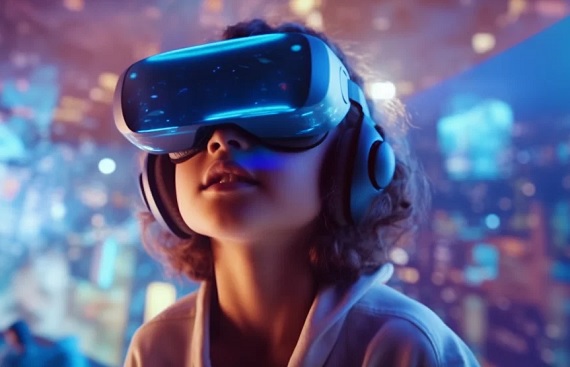Imagining the Future with Virtual Reality in 2023

The future of technology holds promises of extraordinary innovation and groundbreaking advancements, and at the forefront of this technological revolution stands Virtual Reality (VR). While once considered a distant concept relegated to the realm of science fiction, VR has swiftly evolved into a powerful force that has the potential to redefine the way we perceive and interact with the world around us. As we step into the year 2023, the landscape of virtual reality has transformed significantly, presenting a myriad of exciting possibilities that were unimaginable just a few years ago. In this rapidly evolving digital age, virtual reality has emerged as a disruptive technology, transcending barriers and enhancing our experiences in diverse sectors of life. From education and healthcare to entertainment and beyond, the immersive and interactive nature of VR has opened new doors to human potential and has become an indispensable tool for innovation and progress. Let's explore the latest developments and breakthroughs. We will witness how VR has the capacity to revolutionize industries, enhance learning, enrich entertainment experiences, and even alter the way we communicate and connect with each other. As we embrace this new frontier, the journey of discovery and endless possibilities with virtual reality unfold before us.
Education and Learning
In the world of education, virtual reality is growing as a powerful tool, transforming how students explore and interact with academic content. In 2023, students can embark on captivating virtual field trips, studying ancient civilizations, diving into the ocean's depths, or venturing into the cosmos. These immersive experiences allow students to grasp complex concepts with heightened clarity and retention. Virtual reality also caters to diverse learning styles, accommodating visual, auditory, and kinesthetic learners. Educators can create interactive simulations and virtual laboratories, enabling hands-on learning in science, engineering, and medicine. Moreover, VR facilitates collaborative learning, encouraging students to work together in shared virtual environments regardless of physical location.
Entertainment and Gaming
The entertainment landscape has undergone a revolutionary transformation with the advent of virtual reality. In 2023, VR has unlocked a new dimension of entertainment, allowing users to step into their favorite movies, games, and TV shows. From thrilling action sequences to emotionally charged storytelling, VR immerses audiences in ways that traditional media cannot match. The gaming industry, in particular, has experienced a renaissance with VR. In 2023, gamers can fully embody their avatars, physically interacting with virtual worlds and characters. Advanced haptic feedback and motion tracking technology provide a sense of presence that draws players into the heart of the action, creating unforgettable gaming experiences. Beyond gaming, VR has also empowered creators to share their work in immersive virtual studios and galleries, expanding creativity. Virtual reality concerts have become increasingly popular, providing a shared experience transcending geographical barriers.
Healthcare and Therapy
Virtual reality is revolutionizing medical training, therapy, and patient care in healthcare. In 2023, medical professionals can hone their skills in realistic VR simulations, performing surgeries and procedures without risking live patients. This hands-on training ensures that medical practitioners are better prepared for real-life challenges, ultimately leading to improved patient outcomes. Virtual reality has also become a powerful therapeutic tool, offering new avenues for treating mental health conditions such as anxiety, phobias, and PTSD. VR-based exposure therapy helps patients confront their fears in controlled virtual environments, leading to desensitization and long-term relief. Moreover, VR has proven to be effective in managing chronic pain. By diverting the patient's attention to immersive experiences, virtual reality can reduce pain perception and enhance overall well-being.
Communication and Connectivity
Virtual reality is revolutionizing medical training, therapy, and patient care in healthcare. In 2023, medical professionals can hone their skills in realistic VR simulations, performing surgeries and procedures without risking live patients. This hands-on training ensures that medical practitioners are better prepared for real-life challenges, ultimately leading to improved patient outcomes. Virtual reality has also become a powerful therapeutic tool, offering new avenues for treating mental health conditions such as anxiety, phobias, and PTSD. VR-based exposure therapy helps patients confront their fears in controlled virtual environments, leading to desensitization and long-term relief. Moreover, VR has proven to be effective in managing chronic pain. By diverting the patient's attention to immersive experiences, virtual reality can reduce pain perception and enhance overall well-being.
Virtual Tourism and Exploration
In a world where sustainability is paramount, virtual reality has opened up new possibilities for travel and exploration. Virtual tourism in 2023 will offer a realistic and eco-friendly alternative to traditional travel. People can visit iconic landmarks, explore natural wonders, and immerse themselves in the culture of far-off places, all without leaving their homes. VR also extends its reach beyond Earth, venturing into space exploration. As space agencies collaborate to make space missions more accessible, virtual reality allows ordinary citizens to experience space travel, making the cosmos a more tangible and awe-inspiring destination.
The Bottom Line
The future of virtual reality in 2023 is nothing short of extraordinary. From revolutionizing education and training to reshaping entertainment and communication, VR has seamlessly integrated into our lives, offering endless possibilities. As technology evolves, the boundaries between the real and the virtual will blur even further, presenting us with exciting challenges and opportunities. However, as we embrace this future with virtual reality, we must remain mindful of ethical considerations and responsible usage. With the potential to reshape human experiences, we must responsibly navigate the fine line between virtual and real, ensuring that this transformative technology enhances the quality of life for all. As we embark on this captivating journey, the boundless potential of virtual reality invite us toward a future where dreams become a reality and the impossible becomes possible.
